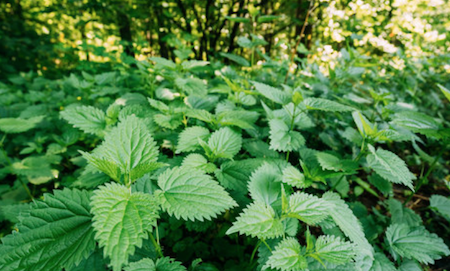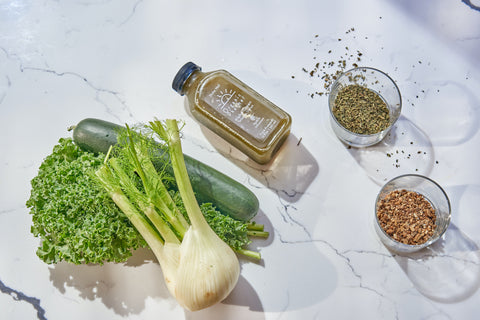Maybe you’re familiar with the stinging nettle plant as simply a nuisance that causes painful skin irritation when you brush up against it on a hike. But did you know that this widely found “weed” is actually a nutritional powerhouse? Rich in vitamins, minerals, fiber and protein, it’s no wonder that this plant is widely used in cuisine as a pot-herb, in herbal teas, and even in agriculture as a plant fertilizer. It’s even been added to bread and pasta doughs to enhance their nutritional value. But its use goes beyond the culinary and into the medicinal as it has a plethora of beneficial actions ranging from anti-diabetic, and anti-cancer, to anti-hypertensive and detoxification. This nutrient-dense herb has a wide-array of uses, but today we want to take a closer look specifically at how it’s been used to treat issues of women’s health. From treating UTIs and painful menstruation, to mitigating and preventing osteoporosis, the nettle plant is an ally not to be overlooked.
Food as medicine: nutrients for all stages of life
Nettles have significant amounts of various essential nutrients, including vitamin A which is crucial for proper vision, reproduction, growth and development, as well as normal immune function. It contains high amounts of vitamin K, manganese, and calcium, all of which are essential for bone health. The trichomes, or the stinging hairs of the nettle plant, surprisingly contain the neurotransmitters acetylcholine and serotonin, which are vital for proper functioning of the nervous system.
It’s no wonder then, that nettle leaf has been used as a pregnancy tea in traditional herbalism. Nettle contains high levels of some of the key minerals necessary during pregnancy, including calcium, iron, and zinc. This high nutrient content provides crucial support for a developing fetus, while also giving the mother the nutrition she needs to grow a healthy baby. Nettle has long been used as a food as well as a medicine, which means that it can safely be eaten in large quantities without posing any risks of toxicity like some other herbs, and is therefore also safe for use during pregnancy without risking the health of the baby. It’s also been used to treat irregular menstrual cycles in women where the underlying cause is due to nutrient deficiencies.
We mentioned vitamin K earlier which specifically stimulates osteoblasts, or specific bone cells, which are responsible for the creation of new bone. Osteoporosis disproportionately affects women due to the hormonal changes experienced during menopause, and nettle can be a powerful preventative approach for this disease. Its high mineral content, including calcium, supports the healthy maintenance of bones, and it also contains boron, which can help to further maintain levels of calcium in the body, providing additional support for aging bones.
Therapeutic compounds and actions

Nettle leaf is a diuretic, meaning it acts on the kidneys to increase urine output, neutralizing toxins in the body and flushing them out as a waste product. Nettles can therefore aid in the body’s natural detoxification pathways, and it’s why we use it in our detox cleanse beverage, Alpha Green. It’s also for this reason that nettle leaf has been used to treat urinary tract infections, which are more common among women than men. Regular use of the herb can also act as a preventative tool.
The nettle plant contains a wide array of phytochemicals that can have beneficial effects on the body, including flavonoids, phenolic compounds, and sterols. Among the notable effects of some of these compounds in nettles is the anti-inflammatory effect. Chronic inflammation in the body, caused by things like poor gut health and chronic stress, can create an overactive immune system. Certain compounds in nettle leaf can cause a cascade of signaling within the immune system to reduce production of pro-inflammatory compounds called cytokines and prostaglandins, thus helping to balance an overactive immune system. It’s because of this that nettles have been used to treat inflammatory conditions like arthritis and fibromyalgia, but also painful periods. Menstrual cramps are caused by the release of prostaglandins in and around the uterus during bleeding, and nettles can reduce the production of these inflammatory compounds, thus reducing pain.
Another therapeutic effect of nettle leaf is that it has astringent properties. An astringent is a type of compound, like the tannins found in tea and red wine, that causes contraction of tissues in the body. This contracting action gives integrity to existing barriers in the body, like in the gut. We absorb nutrients through our gut, but to do so properly and without letting any unwanted food or toxins into the bloodstream like in leaky gut syndrome, we need a strong barrier in our intestinal tissue. Astringents like nettle tea can help to contract the epithelial layer of tissue that forms the boundary between the outer world and our vital organs on the inside, keeping nutrients in and toxins and unwanted particles out. This astringent action works on all types of tissues in the body, not just the gut, and can actually help to stop bleeding. The contraction of tissues caused by astringent compounds also releases water in the process, which can make nettles an ally when bloating is an issue.

Alpha Green: A Foundational Beverage
Now you know some of the many benefits of nettles, what’s the best way to consume them? Probably the easiest way is through the form of an herbal tea. Nettle has a mild, grassy flavor and is easy to drink. As mentioned before, nettle tea is a super safe herb to consume, but proceed with caution if you have any sort of kidney disease and consult your healthcare provider if you are taking any medications. Nettle leaf tea can be found in many health food stores, or online through purveyors like Mountain Rose Herbs. We especially love MRH for their commitment to sustainability and responsible land management in herbal production.
Our favorite way to drink nettles is in our Alpha Green beverage. When paired with greens like celery, parsley, kale, and romaine lettuce, this beverage provides all the nutrients necessary to energize your body for the day. That’s why we include it in all of our cleanses, and it shows up twice in our detox cleanse to provide the extra nutritional support needed for detoxification. Not only is it nutritious and provides the functionality that you’d expect from herbs like nettle and burdock, but it tastes great too! The addition of lemon, cucumber, and mint balances out this beverage and keeps it light and refreshing.
Nettles are just one ally in our functional medicine toolbox, but they are certainly an important one. Their superior nutritional content and powerful antioxidant and anti-inflammatory potential makes them an all around supporter of health. But, despite nettles’ laundry list of benefits, it’s important to remember that nettles are a complex herbal medicine, not a pill synthesized in a lab, and their functionality acts differently than a pharmaceutical solution. Prescription pills and medications are isolated compounds at high potencies designed to create a direct and relatively immediate response in the body. Herbs like nettle leaf are medicinal foods that are beneficial in the same way that other healthy foods are, which is they have the largest effect when consumed regularly over time. So don’t be discouraged if you drink one cup of herbal tea and it doesn’t spark a large change in your life. Be patient, and incorporate small changes on a daily basis and be consistent over a period of a few months to reap the greatest benefits.

About Author: Stephanie is the current fulfillment director and kitchen supervisor for Organic Pharmer. She studied Neuroscience at University of California, Irvine before studying Naturopathic Medicine for 2 years at National University of Natural Medicine in Portland, Oregon. She also spent 3 years studying East Asian Medicine at the same university.
